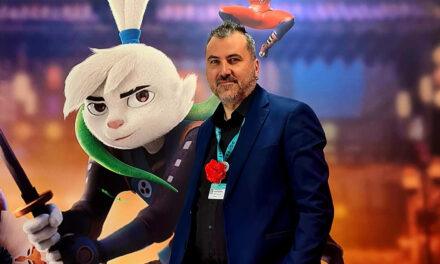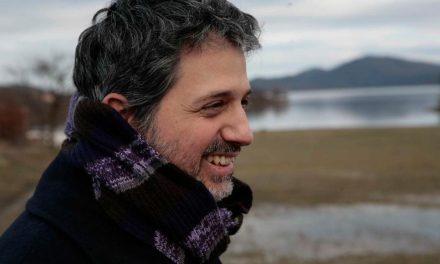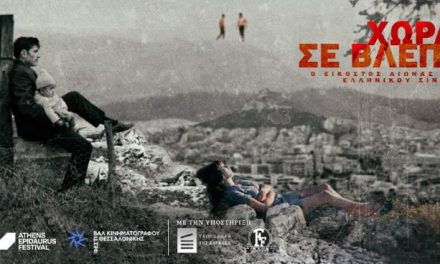What really happened in the eighties? Was that decade a curse, an omen or an unfulfilled wish? For those in their forties and thirties – those who survived it and those who relished it – there’s a fascination with the 80’s maybe because in them lies the key to understanding today’s reality. Nancy Biniadaki’s latest film “The Surface of Things” tries to rematerialize the Greek eighties fthrough the stories of four women, three friends and their teacher at High School in a poor Athens neighbourhood.
Nancy Biniadaki was born in Athens in 1971 and lives in Berlin. She has studied Classical Philology and Film Direction in Athens and Sheffield, England. She has directed several awarded short films, feature-length documentaries mainly for the Greek Public Broadcaster ERT, plays, videos and live performances. She has been awarded with the Greek State Award Melina Merkouri in 1999, the Grimme Preis 2017 for her short film “The Moon and I” (2015) and an award of recognition at the IndieFEST USA for “The Surface of Things” in January 2018.
Biniadaki takes Greek News Agenda* along the path of conflicting emotions that the past inflicts on individuals. As a girl who lived her adolescence in Athens in the eighties, Biniadaki explains the reasons she identified with the novel on which the film is based. As a Greek who lives in Berlin and asked to reflect on what Greeks and Germans think about the eighties, as well as what the eighties meant for her, Biniadaki responds that regardless of whether people love or detest their past, they cannot discard it, and that is something they find out along the way. Biniadaki goes on to explain her complicated relationship with Athens, another cherished character of the film.
“The surface of things” is based on the novel of Angela Dimitrakaki “Four Testimonies about the Exhumation of the River Errinyos”. What prompted you to make the film and how did you work with its adaptation?
The reason I wanted to make this film initially had nothing to do with the novel. We often want to say something, we’re tortured by feelings and ideas, we go through difficult periods, and we believe that there is no story in the whole world that can express what we feel. And then, at least that’s how it works with me, literature comes to save me. Someone happens to offer me a book, or a book that I had read long ago comes and finds me and shows me the story that I’d been looking for.
I was introduced to Angela Dimitrakaki’s novel by a good friend of mine many years ago, while I was doing research for a documentary about the river Kifissos for the ERT TV Series “Paraskinio”. I liked it very much and I used an extract in the opening scene of the documentary. But I also got to know Angela, I read her other books and I admired her work very much. Sometime later my life changed drastically. I left Athens for Berlin, and it was permanent, it was a conscious decision, so I had to adapt to a completely different city and different people, and I guess in the shock of this huge change, the unconscious fear and homesickness, together with the fascination and hope for all the new things to come, the novel just came back to my mind, demanding its place. I knew that I wanted to tell this story. I knew that this was the film I wanted to make.
My collaboration with Angela was amazing. She supported me, she inspired me, she challenged me, and gave me much freedom. It was obvious for her too, that the film is not a mere “adaptation” of the novel, more or less faithful, but a new work of art. The script has been through many stages, many different versions, more or less faithful to the original story. It took us eight years to realise this film! So it changed a lot. I changed a lot while doing it. And what I wanted to say kind of changed too! But the deeper need to tell the story of those girls, which had become my story in the meantime, was always there. That’s why I didn’t give up, although I was often very close. Then came the collaboration with these beautiful actresses: Each one of them took on a character and made them richer, deeper, and more real if I dare say. There is a little piece of each one of us in these women. There is a piece of me, a piece of the actresses, a piece of the original characters of Angela’s novel, I hope. It is just magical how many little personal stories can fit in such a frame!
Two days after the premiere at the Thessaloniki Film Festival, someone who had seen the film, someone I didn’t know before, sent me this simple message on Facebook: “I miss your heroines”. This is why I did this film, if you know what I mean.
You work in Germany. What is your experience of making films there as compared to filmmaking in Greece?
I have not made a feature film in Germany yet. I have worked of course, but I wouldn’t compare the professional conditions and average budgets there to the conditions we had in Greece while doing a small, personal, very-low-budget film like “The Surface of Things”. But I couldn’t have made such a personal film in Germany either; at least not yet. I needed to speak the language of my characters, I needed to know them deeply, I needed to “feel” the locations, the sounds, the colours. I also needed to be able to communicate on set directly and quickly with all my collaborators. My first film had to be shot in Greece, there was no other way!
The river theme is a metonymy in your film about the eighties, a promise of a new life that wasn’t realized. In recent years, there is a certain obsession with the eighties in Greece. How do you explain it? Do you think there is a similar phenomenon in Germany?
It’s always interesting to see the different thoughts that a film evokes in people. To me the river was not a metonymy for the eighties specifically, because the river is eternal. It’s the “avenging” river that reappears in the ’80s, but the river itself is ancient, it’s deep and dark, it was always there, it’s even older than the dinosaurs that so much fascinate the little boy in the film.
Now to the second part of the question: when we were growing up in the ’80s, there was a huge fascination with the ’50s and the ’60s. They were the years of our parents’ youth and our parents were in charge. Now we are the grown-ups and we are in charge so to say, so we talk about our youth in the ’80s, we feel nostalgic or we hate it, we analyse it, we generally enjoy dealing with it. Sofia, one of the characters in the film, says that she doesn’t believe that we tend to think like our parents, as we grow older. Well, I’m afraid we do sometimes…
There is something similar in Germany too, but it has many different parametres of course. In Greece we were living the crazy optimism of the very first socialist government, the promise of social justice, more democracy, equality and other social-democratic ideals, together with a promise of a generalised progress and prosperity. All of that later proved to be a little too much, but people then were naive enough to believe in a bright and easy future. Germany was still divided in two countries. East Germany was living the last years of socialism in poverty and isolation. West Germany was clearly influenced by American pop culture, without any guilt feelings though – contrary to us, with our deep-rooted Anti-Americanism. The girls in my film were dreaming of the far away cities of the song that marked our teenage years “London, Amsterdam or Berlin…,”** the capitals of the underground. Everywhere would be nicer than in the neighborhoods of Athens. We didn’t know that the underground, the post-punk, gothic and new wave scene, as well as the alternative cinema and arts that we were dreaming of, was not a generalised phenomenon in Europe either! In Germany the centre of the sub-culture was the tiny city-island of West Berlin, this walled-in microcosm. Whoever wanted to live differently would flee from a prosperous but conservative and boring West German city or little town, and move to the charmingly run-down, depressing but creatively inspiring West Berlin. It was a different world that we grew up in.
The funny thing though is that the fascination with the ’80s as far as fashion goes, is much more obvious today in the streets of Berlin than in Athens. You see kids perfectly styled, like jumping out of a 1980s magazine! But again, Berlin is such a tolerant city, you can just wear whatever you want, do whatever you want, be whoever you want to be basically, as long as you are true. This is unique, and it is liberating, and it has nothing to do with just the ’80s of course! The tolerance, the free spirit and the hedonism of this city is part of the subject of the documentary that I’m working on at the moment.
What did growing in Athens during the eighties mean for you?
I had to make this film to find out! Well, I still don’t know exactly. The truth is that I spent literally my whole adolescence in the 1980s. In the early eighties I was just a kid listening to Duran Duran, observing my parents’ total euphoria, despite our constant financial problems. By the end of the decade I had become a restless teenager who still couldn’t relate to the political situation, suffocating in a post-working-class/ new-petit-bourgeois environment, desperately wanting to look like Siouxsie Sioux, but who would never dare walk like this in the streets of my neighborhood! So I was content listening to my dark music and falling for my dark idols, closing my eyes to the ugliness around, and hoping that the decade of adolescence (mine and that of my country’s, sort of…) would at some point end. Inevitably, it did. In 1989 I became an adult and the decade ended.
I didn’t know then, what the heroines of my film also tried to forget, that there is absolutely no way you can throw away the past; especially your teens. I am still that girl, like my heroines are still the same girls. We have grown up, but it’s still us, and there are many more around us lost in the crowd. I hope they come to see my film at some point. I think I have a lot to share with them!
How does the city of Athens function in your film?
Athens is like a character in the film. I treat her like a real person. It’s not just a location. But that’s how I see Athens in real life anyway. She’s something like an older sister to me! We have a rather complicated relationship!
If I however wanted to describe in details the role of Athens in the film, it would be like making a thorough analysis of my own film, which I wouldn’t like to do. Let’s just say that “The Surface of Things” is a declaration of love to the city. My heroines are trapped in a similar complicated relationship as me: Ioanna is still living in the same neighbourhood where she grew up and she hates it, it scares her and oppresses her, but she also somehow feels safe there; Sofia lives in a flat with a view over the whole city and she doesn’t even look at it anymore; Mrs Nardi finds refuge in the dead silent ancient cemetery of Kerameikos, an oasis in the heart of the city; And Katerina moved as far away as she could, to a city less ancient, to Berlin, and builds houses there, she’s an architect. They are all defined by the city. “The Surface of Things” is certainly an urban film. It plays in apartments, in streets and on concrete. But it also has the strong bright sun of Athens, the city’s anarchic appearance, its sounds, noises and people. Oh, I miss her terribly now that I talk about it!
I wouldn’t say that the film deals with “women’s issues”, I’m afraid that it would make it sound essayistic. I didn’t try to present and analyse problems or propose solutions – that was not my intention. But “The Surface of Things” is certainly a film about women, in the sense that it shows interesting, I hope, female characters that have a story to tell. Men are very obviously absent in the film, because my aim was to show how women cope with difficulties when forced to be on their own. In that sense, yes, women’s issues are being addressed. And that was very obvious after the screenings at the Thessaloniki Film Festival, when we had long discussions with the audience about women in Greek society, the women of our generation, the role of women in general. But the most beautiful thing is that many women were moved as they saw themselves in the film, they could identify with the characters and the story. A lady in her 60s identified with the character of the history teacher and made comments on behalf of that generation, she talked to me on behalf of my mother and her generation so to speak! And some very young members of the audience began to talk about the teenagers of today, about imagination, dreams and what it means to be young today as compared to the 1980s. This was so exciting and so very moving, and that is why I wanted to make films in the first place. This is my way of discussing “issues”, by telling stories and making people feel emotional. I am not an academic or an essayist. I prefer to communicate my ideas by moving people.
And more important than making films that deal with women’s issues would be for me to see more women making films, to see more women artists, more women in politics and science. This world needs more of the women’s perspective! As a female filmmaker in a rather male-dominated field, I had to struggle a lot in order to be able to make films. But the most important battle I had to fight was not against old patriarchal figures and old-fashioned male colleagues, but against my own personal fears and fixed ideas. The characters in “The Surface of Things” have to come to terms with their position in life, with their decisions, conscious or unconscious, their traumas and their mistakes, their broken dreams and disappointments, and then they are free.
What are your future plans?
I have written the script for a short children’s film. It’s imaginative and funny and playful, it’s very refreshing to write for young children, it’s liberating! I’ve done it before and I enjoy it very much.
My biggest project is a documentary which does actually deal with women’s issues! It concerns the life and work of a woman German painter of the 1920s, who loved painting women. The film is about the role and position of women in society today, how this began to take shape in the 1920s in Berlin and how it is depicted in the work of this painter. It’s a fascinating period, and I’m portraying a great painter and a very brave woman. Because there were times when it took a lot of courage to be a free creative woman! And somehow, it still does.
I’m also working of course on the script for my next feature film, a drama which will most probably again be set in Athens.
* Interview by Florentia Kiortsi
** “London, Amsterdam or Berlin you’ve forgotten exactly where you want to go…”: Wondering Soul song by “Tripes” Greek Rock Band (1983 – 2001)
“The Surface of Things” was projected in the 58th Thessaloniki International Film Festival International Competition Section and was available in the international film viewing professional platform Festival Scope, a TIFF initiative for the promotion of Greek cinema abroad.
Read also via Greek News Agenda: Welcome to the Greek 80s: Interview with Panayis Panayotopoulos, Reading Greece: Angela Dimitrakaki on Subjectivity in Global Landscapes
Watch the “The Surface of Things” trailer:













